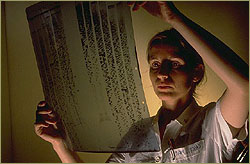
|

|
|
 Millions of children in the developing world die of
malaria every year. Should one of our first goals
after sequencing the genome be to try to develop a
malaria vaccine?
Millions of children in the developing world die of
malaria every year. Should one of our first goals
after sequencing the genome be to try to develop a
malaria vaccine?
|
Manipulating Genes: How Much is Too Much?
Part 2 |
Back to Part 1
NOVA: Will companies in this country that might be
willing to consider this find profit enough to do it? This
issue's come up recently regarding AIDS drugs, with some
pharmaceutical companies lowering the prices of AIDS drugs
in Africa....
Kitcher: Yes, thank God that they've been forced to
do it. Look, there's a moral issue here. In the U.S. we have
a vast, vast amount of the world's resources, and people in
other parts of the world are suffering terribly because of
things that we could cure. What's more, they're suffering
from conditions that we could investigate using the
techniques that are available to us.
It seems to me a very, very serious question whether we
should be pouring as much money as we are into the molecular
genetics of cancer when we could be sequencing the genomes
of known pathogens and working very hard to develop vaccines
that could possibly prevent diseases that kill millions and
millions of children annually. Surely there are some serious
moral issues here. We can certainly justify the expenditure
of some funds on these molecular tools against
cancer, but from the figures I've gotten so far the
disproportion between what we do with respect to cancer and
what we do with respect to diseases like malaria is
extraordinary.
NOVA: What might change our thinking on that, to,
say, do more work on malaria?
Kitcher: I used to hope that people might be
persuaded by moral arguments, issues of compassion. I'm not
sure they will be. Then I used to think that people might be
persuaded by prudential arguments, that they could come to
recognize that the breakdown of health in developing
countries is actually a potential threat to the First World
(and I think it might be).
This is a point made by Laurie Garrett in her very fine and
scary book, The Coming Plague. Her argument is that
the world is now a very small place, infectious disease can
travel very, very fast, and it is unduly confident for the
affluent world to think that it can escape its scourge.
 We in First World countries are fortunate, Kitcher
says, that in recent years we've only had to deal
with genetic and lifestyle-related diseases rather
than major killers like malaria or tuberculosis.
That could change, he adds.
We in First World countries are fortunate, Kitcher
says, that in recent years we've only had to deal
with genetic and lifestyle-related diseases rather
than major killers like malaria or tuberculosis.
That could change, he adds.
|
|
I would extend her point. I think we should think of
ourselves as quite possibly lucky that for a period of time
we've had to worry about things such as genetic diseases and
conditions that strike people in middle age,
lifestyle-induced conditions like greater risks for heart
attacks and so forth. And we haven't had to worry about the
major killers of the past: tuberculosis, plague, malaria,
smallpox, etc.
Well, smallpox is dead. At least we hope smallpox has
completely died out; we have no reason to believe that it
hasn't. But many of the other diseases are waiting to jump
from here to there, as AIDS makes clear to us. They may come
back to haunt us in decades to come.
I think we should be much more concerned about infectious
disease than we are, and I think we should be concerned
about it primarily on moral grounds, that we have an
obligation to do something for people in distant countries.
But even if we are not morally sensitive to those people's
needs, I think we should be worried about the future for
ourselves.
NOVA: Something a lot of people are worried
about is privacy. Should anyone own genetic information? Be
able to patent it?
Kitcher: Well, when asked why he didn't patent the
polio vaccine, Jonas Salk said, "You don't patent the sun."
That's the way I feel about patenting. I think molecular
medicine is a cooperative venture that serves the interests
of all humankind. The idea that it is driven by local
motives and profit and that that forces costs up and makes
it impossible for people to get the drugs they need seems
just wrong. It's inappropriate for medicine to enter this
kind of free-market mentality.
|
"Surely there are other ways to develop incentive
to come up with cures than simply holding out
obscene monetary rewards."
|
I teach [the 18th-century philosopher and economist] Adam
Smith in one of my core classes here at Columbia, and Smith,
great free-marketer that he is, thinks that there are limits
to the market. He thinks there are some things in which you
don't want to have markets. He's quite clear on this. Well,
I think medicine is a place you don't want to have a market.
I don't want the things that are available to people all
around the world to be determined by people that happen to
have capital to invest and can make profits in this way more
easily than in that way. That's just irrational and absurd.
NOVA: Of course, it's been done forever with
pharmaceuticals, right?
Kitcher: That's correct, but I think what we need to
do is reverse the process of patenting rather than to have
more of it. I know the slogan -- "no patents, no cures." But
there are surely other ways to develop incentive to come up
with cures than simply holding out obscene monetary rewards,
including holding out sizeable but not obscene monetary
rewards.
NOVA: What about personal privacy? Should doctors or
the government or anyone else have access to one's genetic
profile?
Kitcher: My inclination used to be to say it doesn't
matter who has access to genetic information if there's
nothing they're allowed to do with it. I mean, it's not that
the genetic information per se is such an invasion of a
person's privacy. If someone knows my DNA information, it's
not as if they know the details of my relationships, my
wife, my children and all of that. It's not that sort of
invasion, that sort of intimacy.
The problem is that people who know things about somebody
else's DNA could use that to make all sorts of interventions
in their lives that are not beneficial to them. So my
thought became, well, you stop people using genetic
information if they have to know it to discriminate.
 A person's genetic pedigree should be held dear,
Kitcher says.
A person's genetic pedigree should be held dear,
Kitcher says.
|
|
I now think it would probably be advisable to supplement
that with as much as you can do to put hedges around genetic
information so that people can't get it, simply because if
they can't get it they can't use it. So I am now in favor of
a double-barreled attack on this: trying to keep the number
of people who have access to genetic information about an
individual to a minimum, and at the same time trying to put
into place regulations and statutes that would prevent
people from using the genetic knowledge they have of another
person to act contrary to another person's rights; having
laws against genetic discrimination in employment and
insurance; and so on.
NOVA: How then can the layman best prepare for the
coming era of molecular medicine? Any advice?
Kitcher: Campaign, for a start, for universal health
care. I mean, the argument I gave in the book is still a
completely valid argument. You may be one of the lucky ones,
but roughly five percent of the population will be unlucky.
Those people will either be uninsurable or only insurable at
prohibitive costs. Once all of this starts to really get
going, and insurance companies begin demanding information
on you from this and that sort of genetic test, some people
are going to find that they can't get the insurance they
need.
Whenever I give talks on this I make this point, and
invariably one or two people come up to me afterward and
say, "I know somebody who..." and tells me a sad story about
the system, about something like this that is happening
already. People are finding that because of the genetic
tests that they have been asked to take or that they
actually have taken, their insurance is now over or changes
drastically.
NOVA: Can you give an example of the kind of disease
for which this kind of discrimination is occurring?
Kitcher: Well, in women with the alleles for breast
cancer.
NOVA: And their insurance changes because of that?
|
 Insurance companies have already begun to deny or
limit insurance to parents of children with genetic
propensities for certain illnesses.
Insurance companies have already begun to deny or
limit insurance to parents of children with genetic
propensities for certain illnesses.
|
Kitcher: Yes. There are other scenarios, too. There
was a couple who had a son who was diagnosed with Fragile X
syndrome, and they managed to get some insurance for him
that would cover various forms of medication and medical
attention for him. But the insurance ran out when he was
about five. There have been people for whom the same is true
with cystic fibrosis. They've managed to get insurance at a
very high cost with a cap on it. What that means is that
they can intervene for a little while in their children's
lives, and then they can't afford it anymore.
NOVA: Down the road do you see genetic testing
possibly engendering a new class system that distinguishes
people based on their genes?
Kitcher: Well, I think it's possible. I think it will
just work with the existing class system.
NOVA: Rich versus poor?
Kitcher: Yes. But some people who are very rich --
Republicans should be aware of this -- will find that the
genetic lottery has dealt them or their children or their
grandchildren an especially poor hand, that they are
vulnerable in a way that even their riches won't protect
them against. The genetic lottery doesn't care whether you
are a Republican or a Democrat, and it doesn't care whether
you make $400,000 a year or $30,000.
"The most immediate thing that will happen is the
proliferation of genetic testing, and we are
hideously unprepared for that."
|
|
NOVA: So are we seeing the start of a golden age of
medicine or a potentially unethical and immoral venture?
Kitcher: We're in the middle of a very long
revolution, which will produce lots of medical benefits at
an irregular rate in the next century or two. Where they
will come is, I think, hard to predict with any accuracy.
The most immediate thing that will happen is the
proliferation of genetic testing, and we are hideously
unprepared for that.
If I had to predict what will happen, it will be something
like this: Our cures and treatments will come at a
relatively slow rate. There will be promises of cures, but
it will be terribly difficult to work some of these things
out. (Ironically, however -- getting back to something I
mentioned earlier -- vaccines might be one place where we
could make advances more quickly.) Anyway, cures for things
like cancer or remedies for heart disease and so forth will
come, but they will come irregularly and slowly.
While all this is happening, there will be an era of genetic
testing, and people will be pitched into this era with
inadequate genetic counseling. We'll have doctors who don't
know enough about genetics and patients who are completely
inadequately protected. So what will happen, I predict,
within the next 20 years is that everybody will know
somebody whose life has been changed for the worse because
of a genetic test, and eventually, perhaps, this amazingly
individualistic country will stagger towards the realization
that it has to put some protections in place for people.
Photos: (1) Courtesy of Philip Kitcher; (2-6) Corbis
Images; (7,8) WGBH/NOVA.
Watch the Program Here
|
Our Genetic Future (A Survey)
Manipulating Genes: How Much is Too Much?
|
Understanding Heredity
Explore a Stretch of Code
|
Nature vs Nurture Revisited
Sequence for Yourself
|
Journey into DNA |
Meet the Decoders
Resources
|
Update to Program
|
Teacher's Guide
|
Transcript
Site Map
|
Cracking the Code of Life Home
Editor's Picks
|
Previous Sites
|
Join Us/E-mail
|
TV/Web Schedule
|
About NOVA
Watch NOVAs online
|
Teachers |
Site Map
|
Shop
|
Search |
To Print
PBS Online |
NOVA Online |
WGBH
©
| Updated April 2001
|
|
|